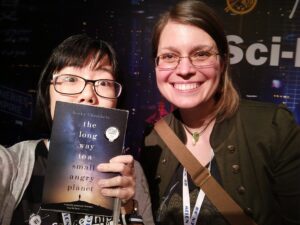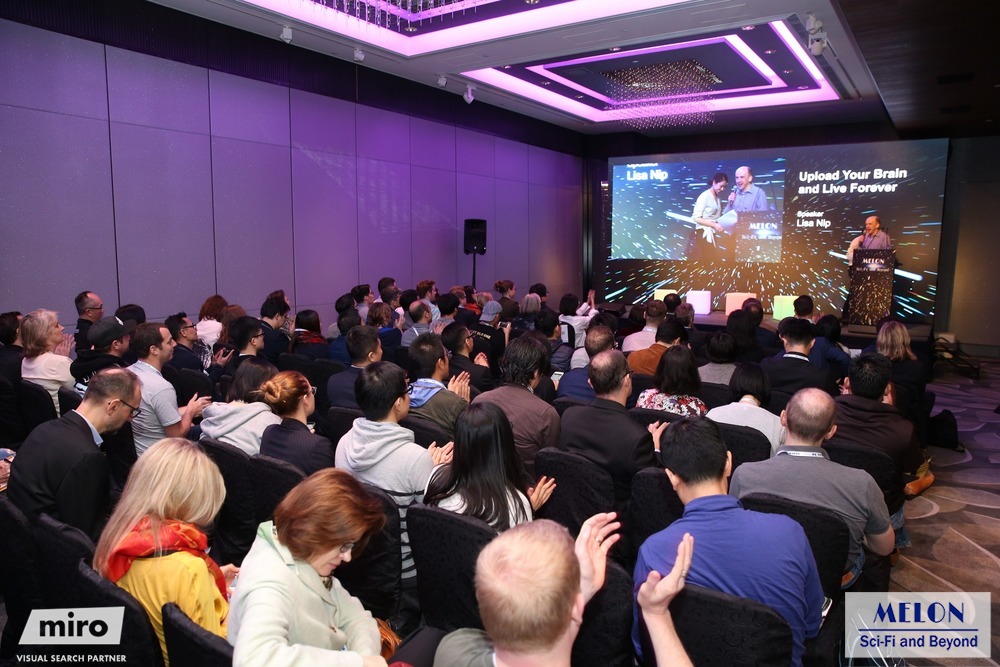Melon HK, 2018 by Gabrielle TSUI

Sometimes, being an English major isn’t just about surrounding yourself with poetry and literary essays. Sometimes, the literary arts and the hard sciences aren’t so mutually exclusive. At Melon: Sci-Fi and Beyond – a conference dedicated science fiction and science fact – I got to see the wonderful intersection of science and the literary, with keynotes and panels ranging from discussions on novel writing to genetic manipulation, from how publishing has changed over the years to the development of artificial intelligence.
Sometimes, then, as an English major you get the awesome chance to talk about space, aliens, biological manipulation, artificial intelligence, and the commercial reality of content creation. Thanks to one of our professors, some English majors like myself had the chance to attend this science fiction conference which boasted both creative talents and international industry experts.
Melon 2018 kicked off with an introduction from science fiction veteran Allen Steele, who gave a rundown of the genre and its influences, and from 9:00 in the morning to 5:00 in the afternoon, a function room at the JW Marriott Hotel was abuzz with questions being asked and minds being blown by authors, investors, astrophysicists, filmmakers, astronomers, and lawyers alike.
Think: How will artificial intelligence develop? Will it eventually take over the world? How can human beings evolve to explore deep space? How does science fiction make money in our commercial reality? Did science fiction really influence scientific development? How does the industry of content creation in China differ from the America? Do we need scientific knowledge in order to write a compelling scientific universe, or is it our personal experiences that shape these fictional worlds? How do we get our work published these days? And most importantly, what about the ALIENS? Where are the aliens…?!
Over endless coffee and a stunning lunch buffet, these questions were scrutinized in great detail. It was a room full of knowledge and wit: Locus Award winner Yoon Ha Lee reflected on how his transsexual experiences are presented within the realm of science fiction; senior astronomer Seth Shostak called in from the SETI institute to cheerfully bring us up to speed on his search for ET; Hong Kong-based film producer Derek Ting discussed Asian representation in film and drew inspiration from the recent superhero blockbuster Black Panther; and Arthur C. Clark Award-nominated author Becky Chambers talked about making the future relatable and something worth looking forward to in her novels.
Sometimes, as an English major you get to be in the room where it happens, and then you leave it with a notebook filled with scribbled notes, your fingertips electric with new ideas. Astrophysicist Hilke Schlichting said, “Science fiction … is like a thought experiment for real life scientists.” And as English majors, we know that while works of literature are the result of external happenings and real world developments, literature can also be the spark that lights the flames of change.
For me, it was Allen Steele who summed up perfectly the significance of literature to our present technological world. “Look at the older works of science fiction,” he said, “and you’ll see the ideas that have shaped the 21st century…”
It seems literature really might be central to this scientific world of ours.
(Special thanks to Professor Grant Hamilton for the opportunity and tickets to attend Melon HK, 2018)







